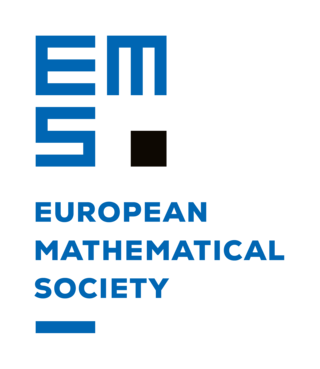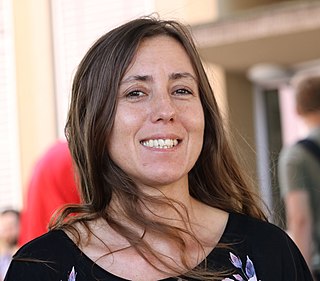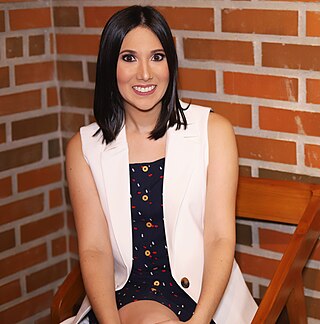
The Fields Medal is a prize awarded to two, three, or four mathematicians under 40 years of age at the International Congress of the International Mathematical Union (IMU), a meeting that takes place every four years. The name of the award honours the Canadian mathematician John Charles Fields.

The International Mathematical Union (IMU) is an international non-governmental organization devoted to international cooperation in the field of mathematics across the world. It is a member of the International Science Council (ISC) and supports the International Congress of Mathematicians (ICM). Its members are national mathematics organizations from more than 80 countries.
The IMU Abacus Medal, known before 2022 as the Rolf Nevanlinna Prize, is awarded once every four years at the International Congress of Mathematicians, hosted by the International Mathematical Union (IMU), for outstanding contributions in Mathematical Aspects of Information Sciences including:
- All mathematical aspects of computer science, including computational complexity theory, logic of programming languages, analysis of algorithms, cryptography, computer vision, pattern recognition, information processing and modelling of intelligence.
- Scientific computing and numerical analysis. Computational aspects of optimization and control theory. Computer algebra.

The European Mathematical Society (EMS) is a European organization dedicated to the development of mathematics in Europe. Its members are different mathematical societies in Europe, academic institutions and individual mathematicians. The current president is Jan Philip Solovej, professor at the Department of Mathematics at the University of Copenhagen.
The European Congress of Mathematics (ECM) is the second largest international conference of the mathematics community, after the International Congresses of Mathematicians (ICM).
The Chern Medal is an international award recognizing outstanding lifelong achievement of the highest level in the field of mathematics. The prize is given at the International Congress of Mathematicians (ICM), which is held every four years.

Cornelia Druțu is a Romanian mathematician notable for her contributions in the area of geometric group theory. She is Professor of mathematics at the University of Oxford and Fellow of Exeter College, Oxford.
L'association femmes et mathématiques, created in 1987, is a voluntary association promoting women in scientific studies and research in general, and mathematics in particular. This organization currently has about 200 members, including university professors of math, math teachers, sociologists, philosophers and historians that are interested in the "woman question" in scientific domains.
This is a timeline of women in mathematics.
Marta Sanz-Solé is a Spanish mathematician specializing in probability theory. She obtained her PhD in 1978 from the University of Barcelona under the supervision of David Nualart.

Marcelo Miranda Viana da Silva is a Brazilian mathematician working in dynamical systems theory. He proved the Zorich–Kontsevich conjecture together with Artur Avila.

Svetlana Yakovlevna Jitomirskaya is a Soviet-born American mathematician working on dynamical systems and mathematical physics. She is a distinguished professor of mathematics at Georgia Tech and UC Irvine. She is best known for solving the ten martini problem along with mathematician Artur Avila.
John Wermer was a mathematician specializing in Complex analysis.

Guoliang Yu is a Chinese American mathematician. After receiving his Ph.D from SUNY at Stony Brook in 1991 under the direction of Ronald G. Douglas, Yu spent time at the Mathematical Sciences Research Institute (1991–1992), the University of Colorado at Boulder (1992–2000), Vanderbilt University (2000–2012), and a variety of visiting positions. He currently holds the Powell Chair in Mathematics and was appointed University Distinguished Professor in 2018 at Texas A&M University. He is a fellow of the American Mathematical Society.
The Turkish Mathematical Society is a Turkish organization dedicated to the development of mathematics in Turkey. Its members are individual mathematicians living in Turkey or Turkish mathematicians living abroad.
Autumn Kent is an American mathematician specializing in topology and geometry. She is a professor of mathematics and Vilas Associate at the University of Wisconsin. She is a transgender woman and a promoter of trans rights.
Alessandra Celletti is an Italian mathematician. She earned a master's degree in mathematics in 1984 at the University of Rome La Sapienza, and a PhD in 1989 at the Swiss Federal Institute of Technology in Zurich (ETH) under the supervision of Jürgen Moser and Jörg Waldvogel. Her research activity concerns dynamical systems, Kolmogorov–Arnold–Moser (KAM) theory, and celestial mechanics.

Klavdija Kutnar is a Slovene mathematician. She received her PhD at the University of Primorska (UP) in 2008, and she currently serves as the Rector of the university.

Jeanette Shakalli is a Panamanian mathematician best known for her outreach activities in the Republic of Panama. She is currently Executive Director of the Panamanian Foundation for the Promotion of Mathematics (FUNDAPROMAT) a private non-profit foundation established to promote the study of mathematics in Panama.
Michael Hochman is an Israeli mathematician, currently a professor at the Hebrew University of Jerusalem. He is known for his contributions to dynamical systems and ergodic theory.









